TODAY’S READING FROM THE OLD TESTAMENT- 2 SAMUEL 15:23-16:23
David is forced to leave ‘the city of David’.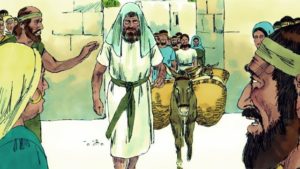
As he crosses the Kidron, the brook that marks Jerusalem’s eastern edge, the whole countryside weeps. The Kidron Valley is just outside the Eastern Gate of the city and at the foot of the Mount of Olives. With them was the Ark of the covenant, representing God’s presence. It was carried by the Levites according to the command given to Moses. The ark stood still and Abiathar offered sacrifices while the people crossed the river on their exit. It reminds us of the ark stationed in the midst of the Jordan when the people crossed into the promised land.
Once the people had passed, David tells Zadok, the priest, to take the ark back into the city. He would not presume that he was right to take it with him, though he knew he had been Israel’s rightful king.
2 Samuel 15:25-26 25 The king said to Zadok, “Return the ark of God to the city. If I find favor in the sight of the LORD, then He will bring me back again and show me both it and His habitation. 26 But if He should say thus, ‘I have no delight in you,’ behold, here I am, let Him do to me as seems good to Him.”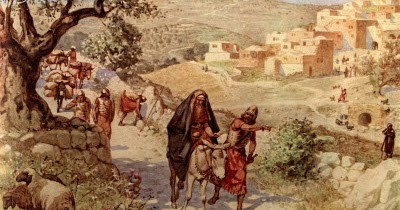
David, in the midst of this sad situation, puts his confidence in the goodness of God. This is the distinguishing mark of a man of faith. He trusts God’s self-revelation in the Word. David is facing adversity. His own son has risen up against him, stolen the hearts of God’s people, and usurped David’s right to rule as God’s anointed King. Yet David does not cast away his confidence in God’s character and His faithfulness to His Word.
God was at work shaping David’s heart. David would continue to recognize God’s worthy character and respond accordingly, no matter what the circumstances. He rests in God’s goodness and trusts in His promises. This is what it means to have a heart after God.
David is abandoning his future to God. He is putting his situation in God’s hands, knowing that God will fulfill His good purposes, no matter the circumstance, no matter the human decisions and motives. He orders the official Levitical supervisors, Zadok and Abiathar, to return with the Ark to Jerusalem and stay there. For according to the Word of God, that is where the purpose and promises of God will be fulfilled. The Lord is the true King of Israel, and although David had lost his throne, God had not lost His. So, the true King remains in Jerusalem, symbolized by the Ark of the covenant, while David leaves, once again a refugee.
David and the people are not behaving stoically, gritting their teeth, and holding back their tears. They are weeping because of these tragic turn of events. Absalom had conspired to take the throne away from his father and set himself up as king instead.
David sends his friend, Hushai, back to Jerusalem, to serve Absalom and frustrate the counsel of Ahithophel, David’s former advisor who had recently joined Absalom’s conspiracy.
Ziba, arrives with supplies for David’s entourage fleeing the city. He reports that his master, Mephibosheth, is rejoicing at the prospect of the kingdom returning to the house of Saul and siding with Absalom.
David thinking Ziba’s report is true, grants all of Mephibosheth’s possessions to Ziba.
Another member of Saul’s family appears as David moves further away from Jerusalem to Bahurim. It is Shemei and he curses David and pelts him with stones. He is David’s accuser saying: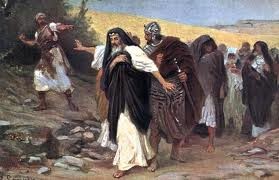
2 Samuel 16:7-8 7 Thus Shimei said when he cursed, “Get out, get out, you man of bloodshed, and worthless fellow! 8 “The LORD has returned upon you all the bloodshed of the house of Saul, in whose place you have reigned; and the LORD has given the kingdom into the hand of your son Absalom. And behold, you are taken in your own evil, for you are a man of bloodshed!”
Abishai wants to kill Shemei for his behavior. David restrains him recognizing that God is in control and the Lord is allowing Shemei’s cursing.
When Absalom arrives in Jerusalem, he asks his counselor, Ahithophel, for political advice. God answers David’s prayers to confound Ahithophel’s counsel and make it appear foolish (2 Samuel 15:31). This incident also fulfills Nathan’s prophecy that because of David’s sin, another man would sleep with his wives and concubines.
2 Samuel 12:11-12 11 “Thus says the LORD, ‘Behold, I will raise up evil against you from your own household; I will even take your wives before your eyes and give them to your companion, and he will lie with your wives in broad daylight. 12 ‘Indeed you did it secretly, but I will do this thing before all Israel, and under the sun.'”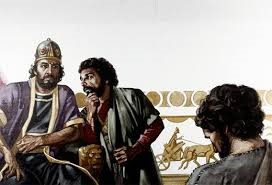
Ahithophel suggests that Absalom start with a provocative demonstration of his disrespect for all David stood for, by setting up a tent on the roof of the king’s palace where he can lay with his father’s concubines. This would make it clear that he is no longer more than a stench in his father’s nostrils and politically his own man. Absalom was laying claim to the throne.
TODAY’S READING FROM THE NEW TESTAMENT – JOHN 18:25-19:22
Peter warms himself by the fire while people ask if he was one of Jesus’ disciples. Peter denies this. A relative of Malchus, the temple guard member whose ear was cut off by Peter, asks, “Didn’t I see you with him in the olive grove (Gethsemane)?” Peter once again denied knowing Jesus. Then, the rooster began to crow, as Jesus had predicted.
After His first hearing before Annas, Jesus is taken to appear before Caiaphas (John 18:24). John passes over the details which are provided in the Synoptics. Luke records that this next hearing is at daybreak. Luke records Jesus’ bold claim before Caiaphas.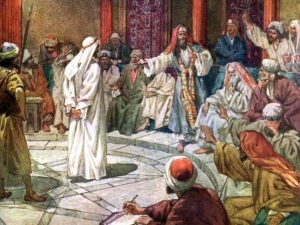
Luke 22:70 70 And they all said, “Are You the Son of God, then?”
And He said to them, “Yes, I am.”
He is then taken to Pilate. The Jewish leaders would not enter Pilate’s palace because they did not want to be ceremonially unclean (John 18:28). They wanted to partake of the Passover at sundown. According to the ceremonial law, It was important to put away all leaven. They did not realize that the uncleanness, the leaven, was in their own hearts and that the Passover Lamb, God’s ordained means for putting away sin, was standing before them.
The Jewish leaders want Jesus executed, and because they wanted him dead, they were insistent that Jesus be tried by one who had the authority to sentence Jesus to death, Pontius Pilate, the Roman procurator. Only the Romans have the legal right to execute capital punishment. John acknowledges God’s hand in this, as the prophets spoke of the Messiah’s death being by crucifixion and not by stoning, the punishment for blasphemy according to the law of Moses.
John notes that this would occur as Jesus had predicted. Jesus was going to be crucified (Matthew 16:21; 20:19; 26:2; Mark 8:31; 9:31; Luke 9:22).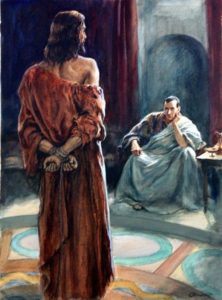
Pilate interrogates Jesus, but it is Jesus who is in control of the interview. He is making it plain to Pilate that He represents a kingdom that has sovereignty greater than that of Rome, a jurisdiction far more reaching than those of this world.
Verse 37 is so telling:
John 18:37 37 Therefore Pilate said to Him, “So You are a king?” Jesus answered, “You say correctly that I am a king. For this I have been born, and for this I have come into the world, to testify to the truth. Everyone who is of the truth hears My voice.”
Pilate asks, “What is truth?” as Truth stares him in the face. (See John 18:38)
Pilate can find no fault in Jesus (John 18:38). He repeats this in John 19:4 and again in John 19:6. Luke records Pilate saying this in Luke 23:4, 14 and 22. In the Book of Acts we learn that the religious leaders who wanted him dead could find no guilt in him (Acts 13:28). The verdict that no fault, or guilt is found in Jesus is recorded 7 times. Matthew adds that Pilate’s wife had a disturbing dream warning her husband to have nothing to do with this RIGHTEOUS MAN (Matthew 27:19).
Pilate seeks a way of escape. Luke records that Pilate learns that Herod is in town, and because Herod has authority over the Galilean province, and Jesus was a Galilean, he sent Jesus to be tried by Herod. Herod hopes that Jesus would entertain him with a sign. Jesus does not comply, nor does he respond to Herod’s interrogation. He is silent like a sheep prepared for slaughter. Herod’s soldiers treat Jesus with contempt and mock his claim as King of the Jews by dressing him in robes and sending him back to Pilate (Luke 23:6-12). From that point on, Pilate and Herod, who had been enemies, become friends, united in their darkness.
Pilate tries to set Jesus free. He leans on a Jewish tradition of releasing a prisoner at the Passover, as it was the Day of Preparation.
John 18:39-40 39 “But you have a custom that I release someone for you at the Passover; do you wish then that I release for you the King of the Jews?” 40 So they cried out again, saying, “Not this Man, but Barabbas.” Now Barabbas was a robber.
The people chose to release and exonerate one who was known for rebellion against authority. They condemn and call for the crucifixion of the only One who was a perfect subject to God’s authority.
Jesus is flogged, mocked, and crowned with thorns. Like the officials in Annas’ court, they once again slap God in the face (John 18:22; 19:3).
Wearing the crown of thorns given by Pilate’s soldiers and purple robes given by Herod’s men, Pilate presents Jesus to the Jews saying, “Behold the man”. In Latin, “Ecce homo” .
Pilate becomes more fearful as the chief priests and officials press him to crucify Jesus because Jesus claims to be the Son of God (John 19:7).
Pilate is desperate. He interviews Jesus once again. He asks where Jesus is really from.
John 19:10 10 So Pilate *said to Him, “You do not speak to me? Do You not know that I have authority to release You, and I have authority to crucify You?”
John 19:11 11 Jesus answered, “You would have no authority over Me, unless it had been given you from above; for this reason he who delivered Me to you has the greater sin.”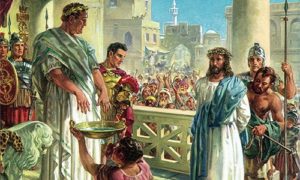
Pilate continues to try to set Jesus free, but the Jewish leaders will not have it. They betray their own faith by saying, “We have no king but Caesar.” (John 19:15).
Finally, Pilate hands Jesus over to be crucified. The soldiers take charge of the execution process. Jesus carries the patibulum, the heavy wooden cross beam that he would be nailed to once he reached ‘the place of the skull’ (Golgotha).
Jesus being crucified on the place of the skull is a prophetic picture of the promised seed of the woman crushing the head of the serpent (Genesis 3:15; Hebrews 2:14-15).
There Jesus is identified with the transgressors, fulfilling the prophecies of the suffering servant (Isaiah 53:12). He is crucified with two others, one on each side. Above each victim of crucifixion is a placard with the name of their crime written. Above Jesus Pilate places the notice of His crime: Jesus of Nazareth, King of the Jews.
The religious authorities protest, “It should read, He CLAIMED to be King of the Jews.” Pilate replies, “What I have written, I have written.”
TODAY’S READING FROM THE BOOK OF PSALMS- PSALM 119:113-128
Each verse in the next section of this Psalm, the longest chapter in the Bible, begins with the Hebrew letter ‘Samekh’.
The Psalmist’s love for the Word changes his regard for the flimsy convictions of men.
Psalm 119:113 113 I hate the double-minded, but I love your law.
In order to develop his love life, he must also develop his hate life. He must shun the influence of the evildoer if he is to keep God’s commands.
He calls upon the Word of God to sustain him (v.116), uphold him (v.117).
His high regard for the Word inspires worship in which he stands in awe of God.
In the next section of eight verses all beginning with the letter, ‘Ayin’, we find a great prayer request:
Psalm 119:125 125 I am your servant; give me understanding, that I may know your testimonies!
He makes his appeal to God to show him mercy, on the basis of the promises in the written Word, as he is tormented by his oppressors. He also makes his appeal for God to act, that He might vindicate His righteousness.
This reminds us of the heightened moral sensibility that comes with the knowledge of God’s Word and also a heightened sense of our need for mercy.
Habakkuk 3:2 2 O LORD, I have heard your speech and was afraid; O LORD, revive Your work in the midst of the years! In the midst of the years make it known; In wrath remember mercy.
TODAY’S READING FROM THE BOOK OF PROVERBS -PROVERBS 16:10-11
Proverbs 16:10-11 10 A divine decision is in the lips of the king; His mouth should not err in judgment. 11 A just balance, and scales belong to the LORD; All the weights of the bag are His concern.
PRAY FOR THE NATIONS (from “Operation World” and “Prayercast.com”)
Germany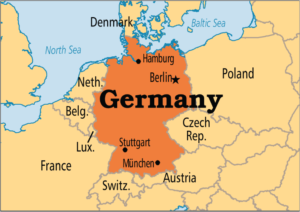
Federal Republic of Germany
Europe
Geography
Area: 357,042 sq. km
Strategically placed in the center of Europe and of the EU.
Population: 82,056,775 Annual Growth: -0.09%
Capital: Berlin
Urbanites: 73.8%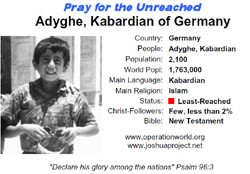
HDI Rank: 22 of 182 (UN Human Development Reports 2009)
Peoples
Peoples: 82 (23% unreached)
Unreached Peoples Prayer Card
Official language: German. There are over 95 million German-speakers worldwide Languages: 69
Religion
Largest Religion: Christian
|
Religion |
|
Pop % |
Ann Gr |
|
52,721,478 |
64.25 |
-0.9 |
|
|
1,740,880 |
2.1 |
0.9 |
Challenges for Prayer
The EKD is a federation of 23 Lutheran, Reformed and United Protestant regional/national churches, but it suffers deep divisions on many levels. The more evangelical/conservative groups and congregations are concentrated in Württemberg, Siegerland and south Saxony. Steadily declining attendance – and therefore income – translates into not only low morale for congregations, but also increasingly empty and crumbling physical structures. Many of the Lutheran clergy do not even believe in life after death; it is often difficult for born-again ministers in the EKD to openly minister in their own churches! Since 2001, the need for evangelization is recognized, and new church-development concepts enjoy popularity; without a return to genuine faith in the Bible, however, new concepts and programs will never replace the need for renewal.
The impact that Germany has had on the world is astounding. It is the birthplace of people such as Martin Luther, Albert Einstein, Karl Marx, and Beethoven, as well as for the reformation, the printing press, and the automobile. But its history is tainted by the atrocities of the Holocaust and two world wars. Yet even so, it has remarkably rebounded from devastation and defeat. Leading the twenty-first century energy revolution, Germany seeks to become the world’s leading user of wind and solar power by 2050. It is this type of forward thinking that has enabled this nation to arise as Europe’s most industrialized country, the continent’s economic giant, co-leader of the European Union, and influential NATO member.
Germany boasts Europe’s largest economy – the fifth largest in the world. This success is built on export industries, fiscal discipline, a highly skilled workforce, and a history of consensus-driven economic policies. When Europe recently faced its largest refugee crisis in years, Germany opened its borders to roughly one million asylum-seekers, quickly becoming their primary European destination. Low fertility rates, an aging population, and increased immigration are taxing the social welfare safety net. This has only increased social and political tensions on how to integrate immigrants into society while maintaining economic stability and German identity.
Sixty-four percent of Germany claims Christianity. However, many believe that religion is irrelevant. Humanism, secularism, and skepticism are pervasive. Only fourteen percent of Germans actually attend church, and only about two percent claim Jesus as Savior. Due to the enormous influx of immigrants, Germany and France now have the largest Muslim populations in Europe, with roughly five million Muslims in Germany alone. Most come from nations where they had little to no access to the Gospel; the opportunities are unprecedented. Growing grassroots prayer movements, house churches, and evangelical initiatives have the potential to reach not only the majority of Germans who are spiritually lost, but the growing Muslim population as well.
PRAYER: Lord, Give us understanding of Your testimonies. Help us, by Your Holy Spirit, to learn what You want to teach us through Your Word. We are grateful for the display of Your mercy and grace in the obedience of Your Son. We marvel at His humility as He is led like a lamb to the slaughter and like a sheep that before its shearers is silent. We shudder at our own depravity that would choose to free the rebellious outlaw and crucify the sinless Savior. Thank You for opening the floodgates of mercy at Calvary where we receive Your pardon and our guilt is removed as far as the east is from the west. Fill us with Your Spirit and make us loyal subjects and bold witnesses to Your kingdom authority. In Jesus’ Name. Amen.
